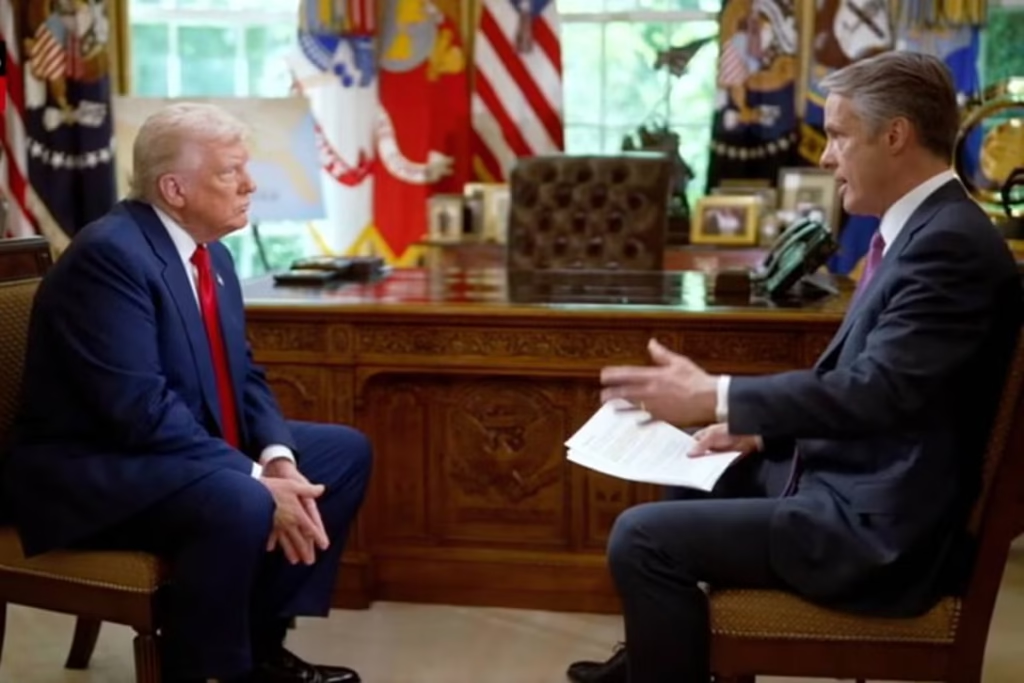President Donald Trump marked his first 100 days in office with a campaign-style rally in Michigan on Saturday, where he defended his policies and attacked the media. In a tense interview with ABC’s Terry Moran, Trump doubled down on his controversial China trade strategy and responded angrily to questions on issues like deportations and the Justice Department.
Trump’s Rally in Michigan: A Celebration of His Achievements
On Saturday, President Donald Trump delivered a speech to an energized crowd in Macomb County, Michigan, celebrating his first 100 days in office. The rally took on the feel of a campaign event, with Trump reminding supporters of his key achievements and promising more to come in the next four years.
Trump touted the success of his administration’s economic policies, including job growth and tax reforms. He dismissed negative approval ratings, calling them “fake” and “not legit,” a common refrain in his response to unfavorable media coverage.
A significant moment during the rally came when a video was shown of deportees being sent to a massive prison in El Salvador. The video, which depicted the deportees having their heads shaved before being locked up, sparked chants of “USA! USA!” from the crowd, underscoring the president’s hardline stance on immigration.
Fiery ABC Interview: Trump Defends Tariffs and Clashes with Moran
Later, in a pre-recorded interview with ABC News, President Trump faced tough questions from reporter Terry Moran. The interview, broadcast on Tuesday evening, was marked by heated exchanges, particularly over Trump’s trade war with China and his administration’s stance on deportations.
When pressed by Moran about the economic impact of the tariffs he imposed on China, Trump remained defiant. He claimed that “the Chinese will eat those tariffs,” repeating his belief that China would bear the financial burden. However, many experts argue that the cost of tariffs is typically passed on to American consumers in the form of higher prices.
Trump on Deportations and the Justice Department
The interview also touched on Trump’s policies regarding deportations, which have been a central part of his immigration strategy. Moran questioned the legality of some of the deportation practices, but Trump responded sharply, defending his administration’s actions as necessary for national security.
Another tense moment occurred when the president was asked about the role of Pete Hegseth, a Fox News personality and close ally of Trump. The president appeared frustrated when questioned about whether he trusted Hegseth “100 percent.” Trump’s irritation was evident as he quickly shifted the conversation back to his policy accomplishments.
The interview took a particularly confrontational turn when the topic of the Justice Department was raised. Trump has frequently accused the department of being weaponized against him and his supporters, a claim that has been a cornerstone of his rhetoric. The president again lashed out at the media, accusing ABC of misrepresenting his policies.
Trump’s Stance on China and Trade Tariffs
Trump’s comments on the China trade war were among the most controversial moments of the interview. Since the early days of his presidency, Trump has emphasized the need for tougher trade policies with China, including tariffs aimed at reducing the U.S. trade deficit. However, critics argue that the tariffs have led to increased costs for American consumers and businesses.
The impact of these tariffs has been a point of contention, with economists warning that higher prices on goods like electronics, clothing, and food could hurt American families. Trump’s repeated insistence that China would ultimately bear the cost has been questioned by many analysts, who note that tariffs often lead to price hikes for consumers rather than for the countries imposing them.
A Divisive Presidency: The Media and Public Response
As Trump continues to face public scrutiny over his policies, his relationship with the media remains a key issue. The president has regularly labeled unfavorable media reports as “fake news,” and his interactions with reporters, like those during the ABC interview, are often marked by tension.
The media, for its part, has questioned the president’s handling of key issues such as immigration, trade, and the rule of law. Trump’s combative rhetoric toward reporters has fueled an ongoing debate over the role of the press in holding public officials accountable.
Trump’s Next Steps: What’s Ahead for His Presidency
Looking ahead, Trump’s second year in office promises more battles over trade, immigration, and his approach to foreign policy. The president’s unwavering support from his base suggests that he will continue to push forward with his agenda, even as critics raise concerns about the long-term effects of his policies.
In Michigan, Trump made it clear that he sees his first 100 days as just the beginning. With a contentious election season looming, the president’s ability to rally his supporters will be crucial in determining his political future.

